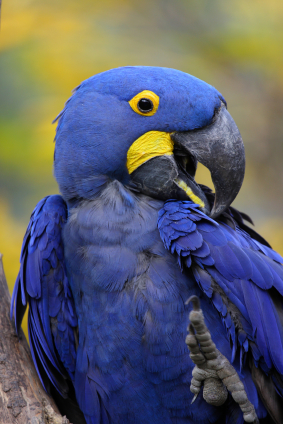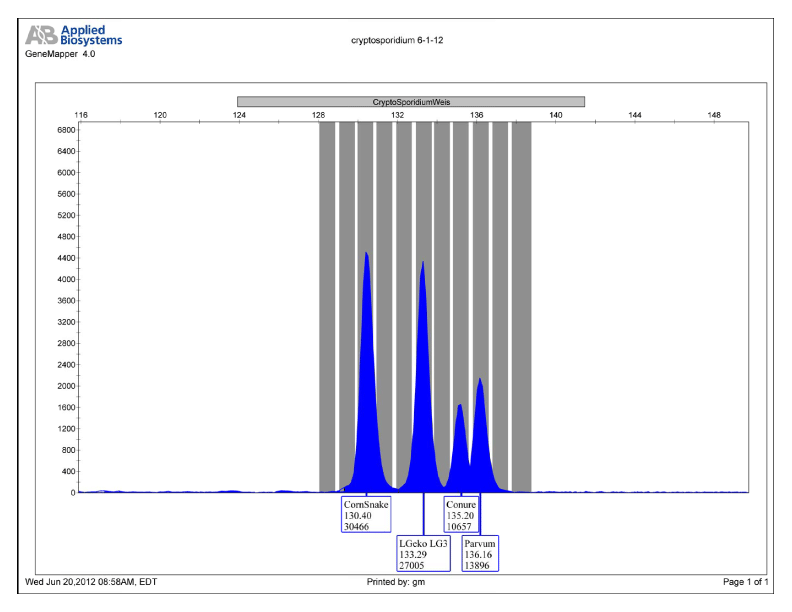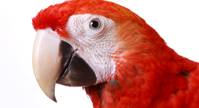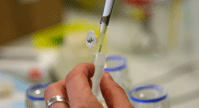Cryptosporidium for Birds and Reptiles Including Leopard Geckos and Snakes
ANIMAL GENETICS OFFERS PCR TESTING FOR CRYPTOSPORIDIUM IN BOTH BIRDS AND REPTILES. CRYPTOSPORIDIUM DOES AFFECT MANY OTHER ANIMALS INCLUDING HUMANS.
Description:
 Cryptosporidium is a small parasite, measuring about 3-5 micrometers in size. Members of the genus Cryptosporidium are parasites of the intestinal tracts of fishes, reptiles, birds, and mammals. A number of researchers believe that to date 23 species of Cryptosporidium have been named, based on host occurrence. It seems, however, that members of this genus do not display a high degree of host specificity, so the number of species in this genus remains a matter of some discussion. Cryptosporidium isolated from humans is now referred to as C. parvum. Cryptosporidium infections have been reported from a variety of wild and domesticated animals and in the last six or seven years, literally hundreds of human infections have been reported, including epidemics in several major urban areas in the United States. Cryptosporidiosis is now recognized as an important opportunistic infection, especially in immunocompromised hosts.
Cryptosporidium is a small parasite, measuring about 3-5 micrometers in size. Members of the genus Cryptosporidium are parasites of the intestinal tracts of fishes, reptiles, birds, and mammals. A number of researchers believe that to date 23 species of Cryptosporidium have been named, based on host occurrence. It seems, however, that members of this genus do not display a high degree of host specificity, so the number of species in this genus remains a matter of some discussion. Cryptosporidium isolated from humans is now referred to as C. parvum. Cryptosporidium infections have been reported from a variety of wild and domesticated animals and in the last six or seven years, literally hundreds of human infections have been reported, including epidemics in several major urban areas in the United States. Cryptosporidiosis is now recognized as an important opportunistic infection, especially in immunocompromised hosts.
In birds, C. baileyi and C. meleagridis as well as C. parvum have been reported. This does not mean that other species of Cryptosporidium cannot effect birds. It simply means that this occurrence has not been shown and it is not yet clear if other species of Cryptosporidium effect birds.
"It lives on (or just under) the surface of the cells lining the small intestine, reproduces asexually, and oocysts are passed in the feces. Transmission of the infection occurs via the oocysts."
Many human infections have been traced to the contamination of drinking water with oocysts from agricultural run-off (i.e., drainage from pastures) so it is considered a zoonosis. Most mammals, birds, reptiles and fish are susceptible to Cryptosporidium infection.
Transmission:
Crypto lives in the intestine of infected humans, birds, fish, reptiles and other animals. Millions of Crypto can be released in a single bowel movement from an infected specimen. Infections occur after oral consumption of the parasite. Crypto may be found in soil, food, water or surfaces that have been contaminated with the feces from infected humans or animals. Crypto is not spread by contact with blood.
Symptoms:
In most patients infected with Cryptosporidium the infection causes a short term, mild diarrhoea. Since such symptoms are associated with a number of ailments, infected individuals may not seek medical treatment and the infection may subside on its own. Thus, it is difficult to say how many Crypto infections occur. On the other hand, individuals with compromised immune systems can develop pronounced, chronic diarrhoea which may persist for weeks or months. Needless to say, such an infection, if not fatal unto itself, can exacerbate other opportunistic infections common in immunocompromised hosts.
In birds, symptoms most associated with Crypto infections include diarrhoea and strong-smelling fecal material. Birds can also develop respiratory signs. In snakes and other reptiles, the most striking clinical manifestation is chronic infections, wasting, swelling of the stomach and other more species-specific symptoms.
Diagnosis:
Animal Genetics uses PCR to amplify a specifically-targeted segment of Cryptosporidium DNA. An Applied Biosystems(TM) 3130xl Genetic Analyzer analyzes the amplified PCR fragment, revealing different sizes. These differences in size correspond to differences in the types of Cryptosporidium species found. Below is an example of four different samples from four different animals in one run. Each peak represents a different strain of Cryptosporidium found. Using this method we can not only identify a Cryptosporidium infection but also identify which strain of Cryptosporidium was found.
Sample Type:
For PCR testing, samples from suspected birds are collected with fresh cloacal and fecal samples. For best results multiple specimens collected over periods of time are recommended. Environmental samples can also be submitted to help evaluate possible contamination of the bird's surroundings.
Limitations:
As with any genetic test, new mutations may occur in the organism's genome that could affect the assay. Therefore, it may be difficult to detect new or different subtypes. Sample collection plays a pivotal part in the overall accuracy of the test so please use caution and follow the instructions carefully.
Treatment:
No therapeutic agent has been clearly identified as effective. However, some encouraging results following use of Paromomycin (an aminoglycoside antibiotic) have been reported. Azithromycin and Lactobin-R (bovine colostrum immunoglobulin concentrate) have had some experimental success. If diarrhoea persists, provide plenty of fluids to prevent dehydration. Rapid loss of fluids because of diarrhoea can be life-threatening. Individuals in poor health or who have a weakened immune system are at higher risk for more severe and more prolonged illness. Consult your veterinarian about specific treatment options.
Submit a Sample for Testing:
To submit a sample download a test submission form at Downloads
Cost per sample is $24.50. Please see our fee schedules below for bulk and combination rates.










